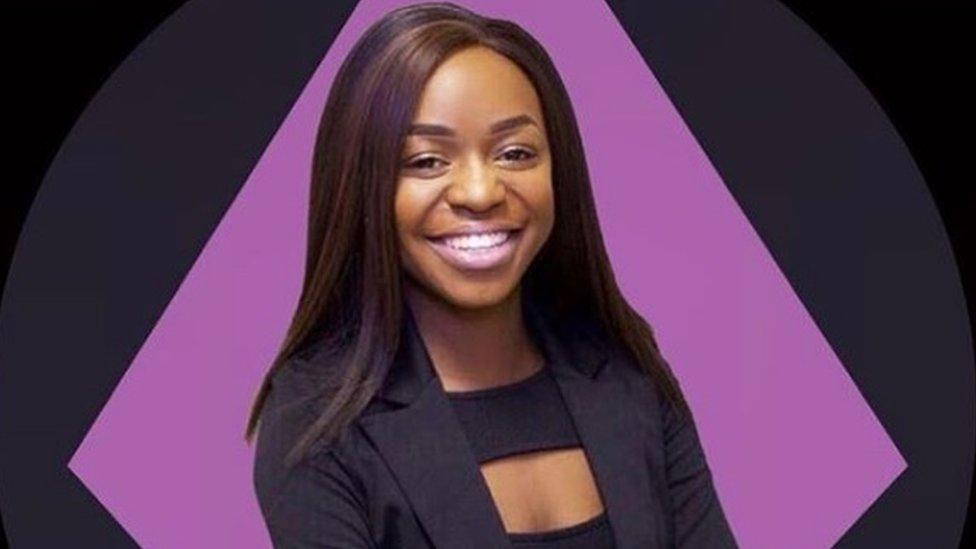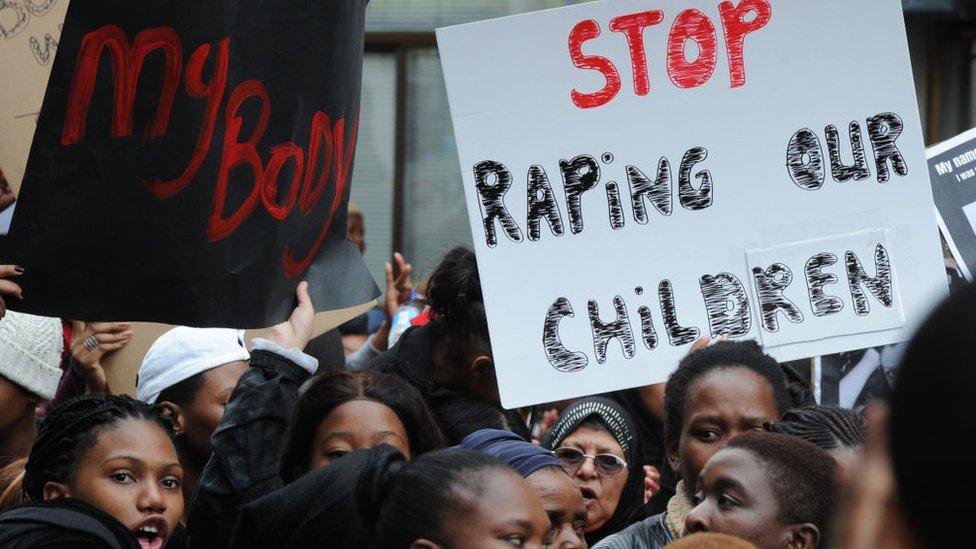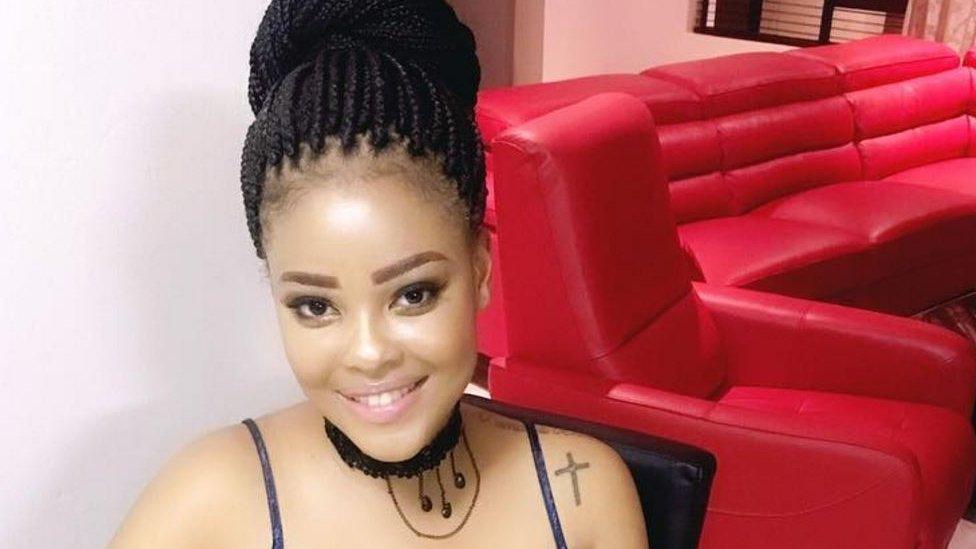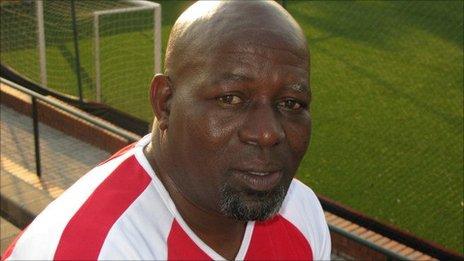Remembering Khensani Maseko who fought South African campus rape
- Published

Khensani Maseko was a vocal protester about an alleged culture of rape at her university
The death of a law student and anti-rape activist in South Africa, whose funeral is being held on Thursday, has brought the simmering issue of campus rape back to the forefront.
Khensani Maseko, 23, took her own life last week after writing a post on Instagram: "No-one deserves to be raped!"
Days earlier the third year student had reported to the authorities at Rhodes University in Grahamstown that she was allegedly raped by a fellow student in May.
"The university immediately made contact with her family [after the alleged rape was reported] and they travelled the next day from Johannesburg to Grahamstown for a meeting where they elected to take Khensani home for a while," Rhodes University said in a statement.
The institution said a decision to suspend the alleged perpetrator was made on Monday, three days after Ms Maseko died.
'She stood up for women'
Her passing left students reeling with grief and anger. The school suspended academic activities on campus for two days after student representatives called for a "campus shutdown" to honour her.
"The world has lost a jewel. It lost someone who really stood up for women," her friend Florence Bagonza, who now lives in Uganda, told the BBC.
"There is something about Khensani that let her stand out. She was confident and when she spoke you could feel her power," she said, adding that they had met in 2016 at a student-organised event called "Women of Influence".
Others agreed she was an active member of student body, juggling various roles as she completed her law degree.
In 2016, she was elected into the university's Student Representative Council (SRF) and was a member of the Economic Freedom Fighters (EEF) party student group.
Radical EFF opposition leader Julius Malema has changed his Twitter profile picture, external to a photo of Ms Maseko wearing his party's beret.
Her interest in student politics and sport inspired her to enter the "Miss Varsity" competition, which is a pageant that helps support university rugby.
Allow X content?
This article contains content provided by X. We ask for your permission before anything is loaded, as they may be using cookies and other technologies. You may want to read X’s cookie policy, external and privacy policy, external before accepting. To view this content choose ‘accept and continue’.

After winning the 2017/18 title, Ms Maseko expressed her excitement about the academic year ahead.
"It is going to be an exciting year, it is going to be unexpected, but it is going to be big things only," she said in a Rhodes University video.
Allow YouTube content?
This article contains content provided by Google YouTube. We ask for your permission before anything is loaded, as they may be using cookies and other technologies. You may want to read Google’s cookie policy, external and privacy policy, external before accepting. To view this content choose ‘accept and continue’.
Close friend Eric Ofei, a former student who now works at Rhodes University, said he also came to know Ms Maseko in 2016 when he mentored her as she ran to become councillor with the SRF.
"She was far from quiet" and could not "be ignored", he said while waiting to get on a plane to Johannesburg, where he will be attending her funeral on Thursday.
Siya Nyulu, who says she cried for an hour after hearing of Ms Maseko's death, says the law student "fought against [alleged] rape culture on campus".
According to the 22-year-old student, Ms Maseko was a supporter of the 2016 student protests over the issue.
Allegations against Rhodes University's campus rape problem began with a poster campaign called "'Chapter 212' to get students talking about rape culture and how to dismantle it", Ms Nyulu told the BBC.
The poster campaign alleged the processes to report rape were inaccessible and there was a lack of staff to process the claims.
Allow X content?
This article contains content provided by X. We ask for your permission before anything is loaded, as they may be using cookies and other technologies. You may want to read X’s cookie policy, external and privacy policy, external before accepting. To view this content choose ‘accept and continue’.
"Members of the movement state that management is accountable for perpetuating rape culture at Rhodes, and these discriminatory and victim-shaming policies must change," Rhodes' student news publication Activate wrote at the time.
Days after, a list of 11 alleged campus rapists was leaked on social media, culminating in students marches and protests that were broken up by police.
According to South African law, suspects in sex crimes can only be named after they have appeared in court and pleaded.

Read more

But students at the university who say they have been victims of rape complain that no action was taken when they reported the assaults.
The protesting students also called for changes in the university's rape policy, demanded the immediate suspension of those listed, and for the burden of proof removed from victims, external.
The hashtag #RUReferencelist began trending in South Africa as the situation escalated when students and sympathetic staff members reportedly clashed with the police who were firing rubber bullets.
The anti-rape protests shut down the university's campus for a week. By the end of the week the university had set up a team to investigate the issue and address the students' demands.
The investigation team came up with around 90 recommendations, but Ms Nyulu said "those recommendations have not been met".
"The university is failing to accept this is the current issue," she said.
"Khensani died for something she was protesting against. How can you say the university has changed when someone has died?"
'Educating men'
The university's vice-chancellor, Sizwe Mabizela, conceded there was a problem on campus during a memorial service for Ms Maseko on Tuesday.
"We always tell young women how they should conduct themselves, yet we fail to tell young men they have no right to interfere with the bodily integrity of another person," he said, according to the South African Independent Online, external.
"We hope this tragic incident will allow the university an opportunity to reflect and engage, even deeper, on how we must pull together as a university and society to eliminate the scourge of gender-based violence."

Women have protested across the country in 2018 against gender-based violence
Both Ms Nyulu and Ms Bagonza said the protests in 2016 were distressing as they are victims of rape.
Ms Bagonza said that while universities are a place for learning, they should acknowledge the wider context of gender-based violence in South Africa and provide "enough resources to help students suffering from mental health issues and rape," she says.
South Africa has one of the highest rape statistics in world - last year there were nearly 4,000 cases reported to the South African police. According to Africa Check, the femicide rate in South Africa is five times higher than the global rate.
The issue is so pernicious that thousands of women demonstrated across the country last week against the increase in gender-based violence.
Meanwhile, students from Nelson Mandela University in Port Elizabeth staged a protest on Monday following an alleged rape last week.
"This is not just about the university, this is something that our society has failed to acknowledge," Ms Bagonza said.
If you are affected by the topics in this article, the Stop Gender violence organisation can be contacted free on 0800 150 150 in South Africa. Alternatively you can contact, LifelineSA Tel: (+27 11) 715-2000 or by email on kgonem@lifeline.org.za
- Published22 May 2017

- Published10 January 2013
- Published30 September 2011
